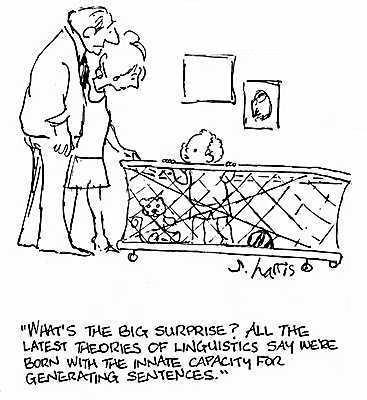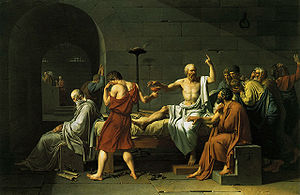
Frye may not have, as Trevor Losh‑Johnson reports someone as saying, an “etiological theory of linguistics,” if that means a theory of the origin or causes of language, but he does have a theory of language––in fact, several theories. He begins his talk “The Expanding World of Metaphor” by saying:
Let us start with literature, and with the fact that literature is an art of words. That means, in the first place, a difference of emphasis between the art and the words. If we choose the emphasis on words, we soon begin to relate the verbal structures we call literary to other verbal structures. We find that there are no clearly marked boundaries, only centres of interest. There are many writers, ranging from Plato to Sartre, whom it is difficult, or more accurately unnecessary, to classify as literary or philosophical. Gradually more and more boundaries dissolve, including the boundary between creators and critics, as every criticism is also a recreation. Sooner or later, in pursuing this direction of study, literary criticism, philosophy, and most of the social sciences come to converge on the study of language itself. The characteristics of language are clearly the essential clue to the nature of everything built out of language.(“The Secular Scripture” and Other Writings on Critical Theory 1976–1991, CW 18, 342–3)
The “characteristics of language” are naturally a part of Frye’s theory of language, the two chief forms of which in his late work are in the first chapters of The Great Code (phases of language) and Words with Power (modes of language). The first chapter of The Great Code, in typical Frye fashion, is elaborately schematic. It begins with Vico’s notion of the three ages of humanity, and then moves through more than a dozen different categories to classify the tripartite phases that language has, more or less historically, passed through: the poetic, the heroic, and the vulgar; the hieroglyphic, the hieratic, and the demotic; the mythical, the allegorical, and the descriptive; the metaphorical, the metonymic, and the similic, and so on. Frye glances at the historical locus of each of these phases, the way each formulates subject‑object relations, the meaning of such words as “God” and “Logos” in each, and the typical form that prose takes in each phase. All of this anatomizing, devoid of Frye’s examples and illustrations, can be summarized in this chart:
